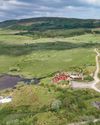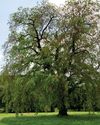
WE are never more than 72 miles from the sea. Britain, including the islands, has a coastline of more than 19,000 miles, a mere 5,000 miles shorter than the circumference of the earth and blessed with all the diversity for which the land has been lauded for centuries. Yet, until the late 18th century— and, really, not until the 20th century—the coast was a distant poor relation, perceived as merely the abode of fishing folk, military fortifications, lawless pirates and smugglers. This was despite Britannia long and proudly parodying itself as an island race and ruling the waves.
William Cobbett in his Rural Rides (1821–26) generally gave the coast a wide berth and H. V. Morton, a century later in his In Search of England, charted a decidedly inland course. The Spectator, when reviewing the Batsford guide to the English coast as late as 1936, could still write with justification that guidebooks generally overlooked ‘the exciting and beautiful relationship of the land to the sea’. Unlike the countryside, which is largely the result of centuries of human endeavour, the coast is the last repository of wilderness, the evocative recall of the absent traveller or the welcome sight on their return—but none of that made an iota of difference.
This story is from the {{IssueName}} edition of {{MagazineName}}.
Start your 7-day Magzter GOLD free trial to access thousands of curated premium stories, and 9,000+ magazines and newspapers.
Already a subscriber ? Sign In
This story is from the {{IssueName}} edition of {{MagazineName}}.
Start your 7-day Magzter GOLD free trial to access thousands of curated premium stories, and 9,000+ magazines and newspapers.
Already a subscriber? Sign In

A leap in the dark
The primal play of light and shadow, whether in Leonardo's ever-so-subtle sfumato or Caravaggio's dramatic contrasts, has shaped Western art, as Michael Hall reveals

Beauty and the blimp
Inflammable airships may be gone, but a new hybrid aircraft, capable of delivering eco-friendly aviation, is set to take to the skies with a bang, finds Charles Harris

Three wishes for food and farming
Royal hedge planting, the terrible toll on Ukrainian farming and a maiden speech

Seeing the wood for the trees
Scotland's much-evolved forestry industry has become a focus for clever investors

Let's fall in love
Birds do it, bees do it, even educated fleas do it. Laura Parker finds that, when it comes to creatures mating for life, persistence, patience and a little dad dancing are key to success

Back from the dead
THREE Wentworth elm saplings have been planted in the grounds of the Palace of Holyroodhouse, Edinburgh, and on the Highgrove estate in Gloucestershire-29 years after what was thought to be the lastknown Wentworth elm died.

A man among men
What makes a master? Beloved of the commercial art world, handled warily by art historians, the word has long been opaque. Michael Prodger investigates its many meanings-and discovers that being male confers an unfair advantage

Unearth one of life's luxuries
Black diamonds are a girl's best friend this Valentine's Day, with Périgord truffle-based skincare from TRUFFE

Adventure awaits
Spend an unforgettable family holiday on the Benmore Estate and experience some of Scotland's finest wildlife and sporting activities

Let the art rule the head
Despite being a world leader in everything from jewellery to fashion and music, the UK is failing to nurture creativity at school and in regional centres. Tristram Hunt, director of the V&A Museum, calls for an urgent review